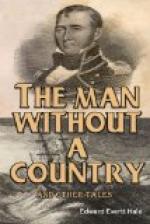Years afterwards she told me how the old man kissed me, how his eyes watered when he asked my story, how she told again of the moment when I was heard screaming on the doorstep, and how she offered to go and bring the paper which had been pinned to my bib. But the old man said it was no matter,—“only we would have called him Marquis,” said he, “if his name was not provided for him. We must not leave him here,” he said; “he shall grow up a farmer’s lad, and not a little cockney.” And so, instead of going the grand round of infirmaries, kitchens, bakeries, and dormitories with the rest, the good old soul went back into the managers’ room, and wrote at the moment a letter to John Myers, who took care of his wild land in St. Lawrence County for him, to ask him if Mrs. Myers would not bring up an orphan baby by hand for him; and if, both together, they would not train this baby till he said “stop”; if, on the other hand, he allowed them, in the yearly account, a hundred dollars each year for the charge.
Anybody who knows how far a hundred dollars goes in the backwoods, in St. Lawrence County, will know that any settler would be glad to take a ward so recommended. Anybody who knew Betsy Myers as well as old Elkanah Ogden did, would know she would have taken any orphan brought to her door, even if he were not recommended at all.
So it happened, thanks to Lafayette and the city council! that I had not been a “Child of the Public” a day, before, in its great, clumsy, liberal way, it had provided for me. I owed my healthy, happy home of the next fourteen years in the wilderness to those marvellous habits, which I should else call absurd, with which we lionize strangers. Because our hospitals and poorhouses are the largest buildings we have, we entertain the Prince of Wales and Jenny Lind alike, by showing them crazy people and paupers. Easy enough to laugh at is the display; but if, dear Public, it happen, that by such a habit you ventilate your Bridewell or your Bedlam, is not the ventilation, perhaps, a compensation for the absurdity? I do not know if Lafayette was any the better for his seeing the Deering Street Asylum; but I do know I was.
This is no history of my life. It is only an illustration of one of its principles. I have no anecdotes of wilderness life to tell, and no sketch of the lovely rugged traits of John and Betsy Myers,—my real father and mother. I have no quest for the pretended parents, who threw me away in my babyhood, to record. They closed accounts with me when they left me on the asylum steps, and I with them. I grew up with such schooling as the public gave,—ten weeks in winter always, and ten in summer, till I was big enough to work on the farm,—better periods of schools, I hold, than on the modern systems. Mr. Ogden I never saw. Regularly he allowed for me the hundred a year till I was nine years old, and then suddenly he died, as the reader perhaps knows. But John Myers kept me as his son, none the less. I knew no change until, when I was fourteen, he thought it time for me to see the world, and sent me to what, in those days, was called a “Manual-Labor School.”




